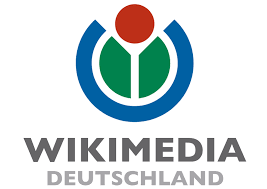Wikimedia Deutschland
Wikimedia Deutschland
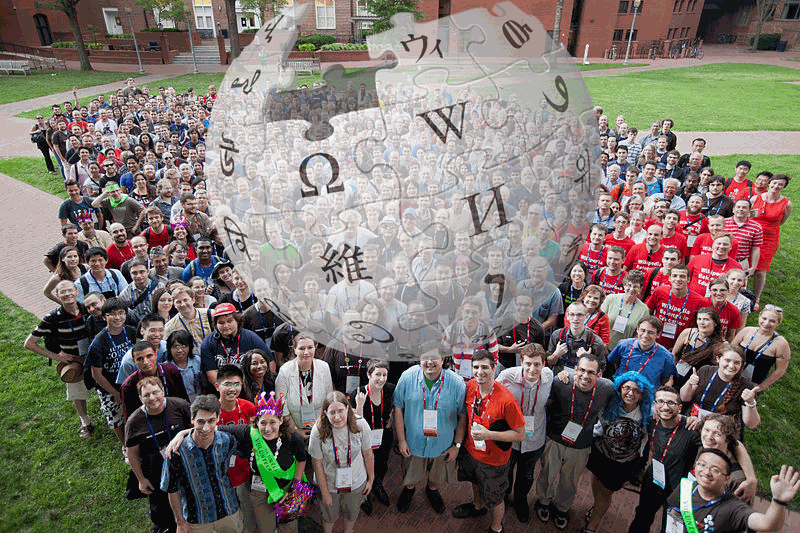
A non-profit organization manages its employees with only one open source solution.
The requirements
At Wikimedia e.V. the personnel department requires a central system with which they can easily, quickly and accurately reflect all the processes of their business area. As a non-profit organization, Wikimedia has its main focus on the use of open-source products with which they can keep the costs low.
In a workshop at the beginning of the project, Wikimedia and IT IS defined the most pressing and important factors for the HR processes and HR management. These were:
- Entry of HR master data
- Administration of working time
- Management of the holiday (claim, application, approval)
Previously, different tools and programs like Apogee Leave and Mite had been used for the personnel management. A great deal of manual use was necessary to identify records, to merge them and to logically represent them in a report what was very time-consuming. The future goal is that employees should use only one system to capture the working hours and holidays. For that they would be logged into just one system and no longer need to work on many different platforms like before.
Every employee has to be able see his overtime and negative time immediately. They shall only be allowed to call up their own state of working hours. The employees should be able to see how the hours entered are assigned to respective projects. A “self-service” would allow all employees to call up their hours of labor at any time in the system.
Holiday management must be handled in this system. For this purpose employees should be able to request vacation. The request is automatically forwarded for approval after checking the state of the amount of vacation days - already taken and how many are still available.
Before consulting IT IS, Wikimedia compared five solutions regarding several aspects including document creation and management, position management, recruiting, further training and of course the cost aspect. They decided on Odoo 8 because of the great cost-benefit ratio. Moreover, there are modules available for nearly all requirements, it has a good design, has great handling and respects the open-source idea.
The Solution by IT IS AG
IT IS AG undertook the following tasks for Wikimedia:
- Implementation of the modules:
- Time tracking
- Vacation administration
- Strong adaptation of the modules mentioned above according to the needs of Wikimedia
- Extension of the user administration
- Creation of a backup strategy
- Hosting the entire solution
IT IS made a number of adjustments in Odoo to individualize the system. Field types were changed meaningfully for German HR: e.g. the tax code range is restricted to figures one to six. Unnecessary fields were removed or hidden. This promotes clarity, speeds up the data entry and reduces sources of error. Additionally, IT IS implemented required fields in the appropriate masks and linked them. IT IS also changed the optical design according to the requirements of Wikimedia Germany.
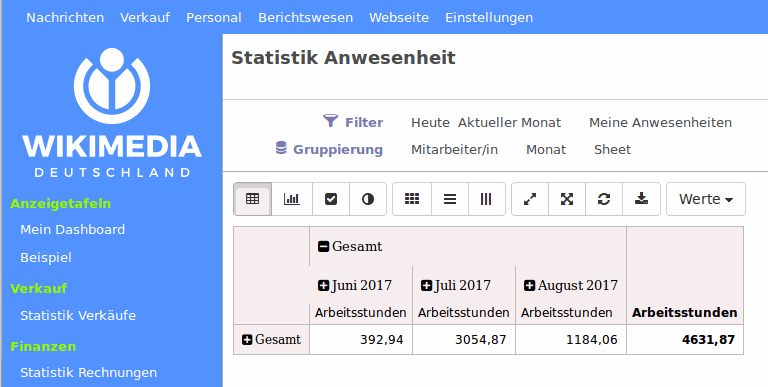
For the timesheet there was a “traffic light system” desired, which lets you know at first glance whether the respective employee is in a positive or negative range and how far along regarding the number of his hours of work. Sick days are entered now by employees of the HR department thanks to the adjustments of the timesheet. Time registration forms are created automatically and correspond to the contracts, holiday and sick days. With the time tracker each evening every employee can check out and record his times with a simple mouse clic
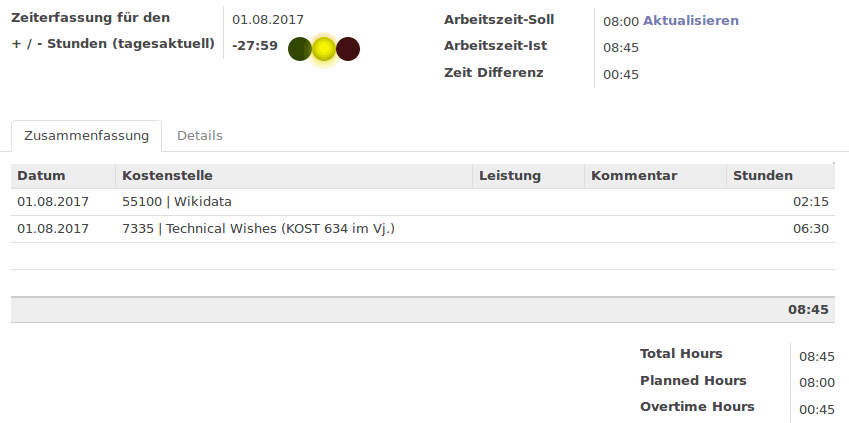
Image 2: In the time recording module a traffic light system shows the start of overtime and negative hours. The times can be expensed directly to specific cost centres or projects.
The previous function for the payroll management in Odoo is not to be used any longer, which is why they had their own menu item evaluated which only HR employees can access. In an additional column in the export data set, it is visible, if and how the data in the selected period has changed. Personnel data is available in various views for which different right groups had to be created. Monthly reports are automatically sent by E-mail, this involved an E-mail template and an action for sending. The various calendars were not linked in Odoo by default. IT IS connected the vacation request calendar and holiday calendar so that both are visible together.
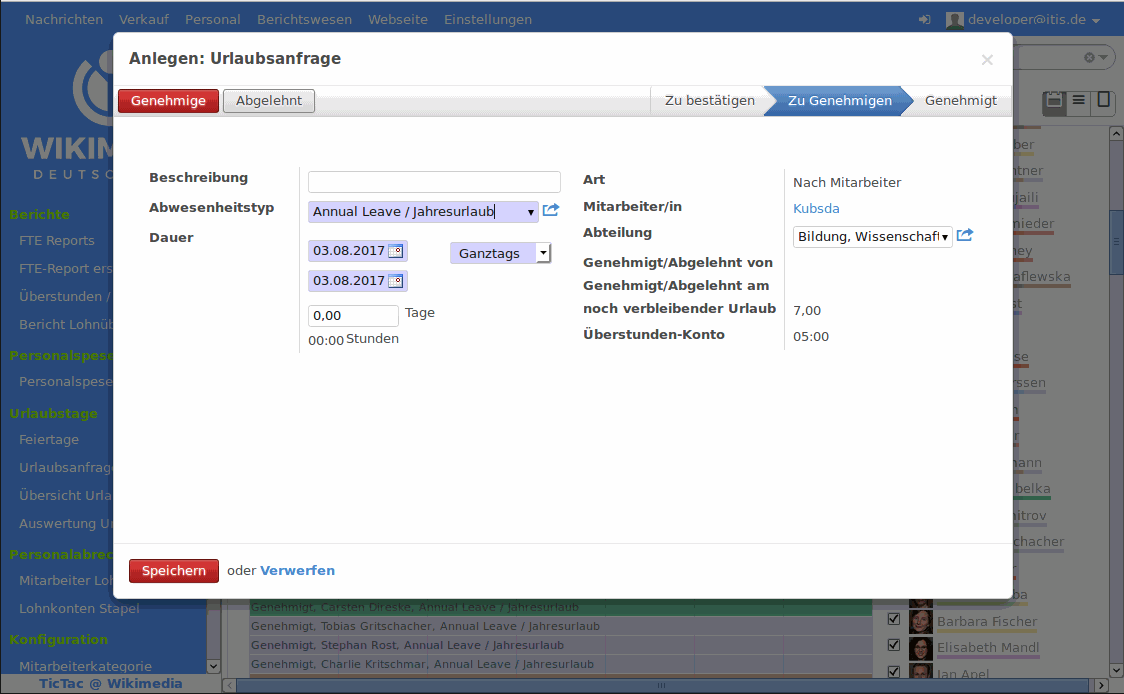
Image 3: Creating a request for leave. The state is always visible for the respective employee.
The whole solution is hosted in the data center of IT IS. The location guarantees high data security due to the data protection regulations in Germany and IT IS is an experienced hosting provider and specialized in Odoo.
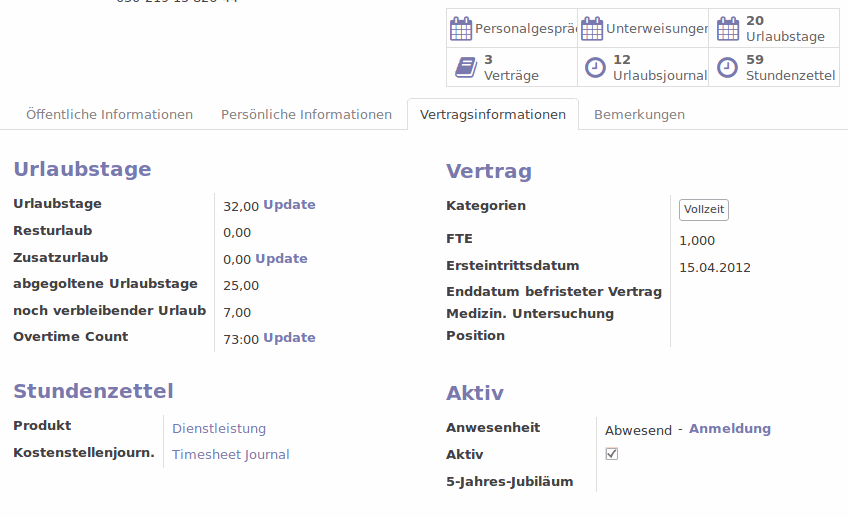
Image 4: All data can be found in the profile of the employee. Depending on the authorization the employees, managers and HR department only see the respectively approved areas.
All these adjustments were specified by IT IS and the customer before the implementation. After the implementation,
both parties checked in user acceptance tests (UAT) for the whole system. In the future it is possible to expand the Odoo system quickly and at any time regarding other business processes of the organization besides the personnel management thanks to the modular architecture of Odoo.
Conclusion
With the implementation of Odoo 8 for the personnel management there is a marked efficiency increase within the business area expected and additional and previously nonexistent or only insufficient services for internal interest groups are realized. Thanks to the now correctly recorded times a fair and equitable time compensation is possible for all employees and the transparent handling with the vacation arrangements simplifies many operations. For the HR department especially the contract management is a relief, particularly the data quality and the needed reporting system are significantly strengthened.
Furthermore, Odoo will enable the human resource department to provide all required information fast and clearly through a central data management. Odoo is completely free in the community version and as an open-source product it is very adaptable to further needs - The perfect solution for Wikimedia Germany! Wikimedia is so keen on IT IS’s customizations that they named the Odoo based product “TicTac”. In the sense of open source TicTac is also available on Github.
About Wikimedia Deutschland
Wikipedia is one of the ten most popular websites in the world. Its content and the content of other Wikimedia projects is created, improved and disseminated by volunteers. Wikimedia Germany supports with their work especially Wikipedia, Wikipedia Commons, Wikidata, but also the smaller projects. All Wikimedia projects are run by the non-profit Wikimedia Foundation. More than 40 independent organizations support the Wikimedia projects on site. Wikimedia Germany is the oldest and largest of them, it was registered as a non-profit association in 2004 and has about 50,000 members nowadays. The association’s goal is to provide free access to knowledge.
